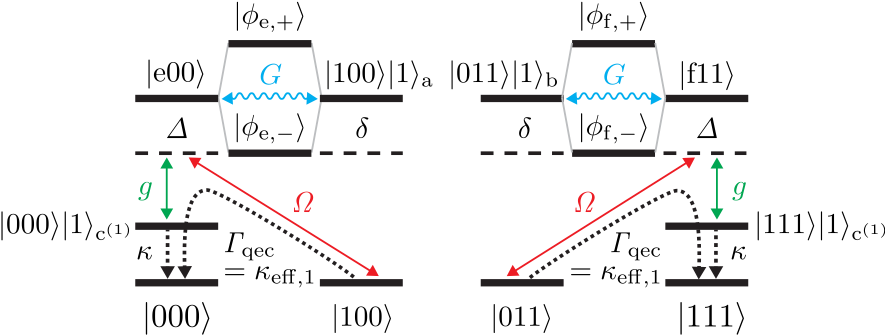Theory
Theoretical research is performed in the team of Dr. Florentin Reiter, supported by an SNF Ambizione grant.

Theoretical research is performed in the team of Dr. Florentin Reiter, supported by an SNF Ambizione grant.
Dissipation engineering for quantum information processing
Quantum information processing is to a large extent performed using unitary gate operations. These are affected by decoherence and dissipation which imposes limitations on realizable quantum information tasks. The alternate strategy of engineering dissipation to play an active role in quantum information [1] has developed into a new paradigm [2] which enriches the toolbox of quantum computing and holds promise to overcome problems with the unitary approach [3].
Engineered dissipation is particularly well-suited for quantum error correction, allowing for protocols that operate in a fully autonomous manner without the need to perform measurements or feedback operations. We develop dissipative quantum error correction schemes which use couplings to an engineered environment to stabilize a quantum memory against sources of error. Such protocols can be used to protect quantum-enhanced sensing schemes [4].
In addition, we are working on high-fidelity operations for trapped ions [5] and superconducting qubits [6], e.g. for the preparation of resource states for quantum information processing.
References
[1] J. F. Poyatos, J. I. Cirac, and P. Zoller, Phys. Rev. Lett. 77, 4728 (1996).
[2] F. Verstraete, M. M. Wolf, and J. I. Cirac, Nat. Phys. 5, 633 (2009).
[3] M. J. Kastoryano, F. Reiter, and A. S. Sørensen, Phys. Rev. Lett. 106, 090502 (2011); Y. Lin, J. P. Gaebler, F. Reiter, T. R. Tan, R. Bowler, A. S. Sørensen, D. Leibfried, and D. J. Wineland, Nature 504, 415 (2013).
[4] F. Reiter, A. S. Sørensen, P. Zoller, and C. A. Muschik, Nat. Comms. 8, 1822 (2017).
[5] K. P. Horn, F. Reiter, Y. Lin, D. Leibfried, and C. P. Koch, New J. Phys. 20, 123010 (2018).
[6] E. Doucet, F. Reiter, L. Ranzani, and A. Kamal, arXiv:1810.03631 (2018).

a) Dissipative spin-boson model comprised of identical spins coupled to a harmonic oscillator, subjected to local decay by spontaneous emission.
b) Cooperative breakdown phase transition: Increasing the spin-oscillator coupling causes a breakdown of the steady-state solution for the oscillator population.
Non-equilibrium quantum many-body physics
Dissipation has also been recognized to be interesting in a quantum simulation context. Non-equilibrium dynamics can lead to novel quantum many-body effects [1] and thereby enrich the phase diagram by dissipative phase transitions [2]. However, the phenomena of open systems are typically harder to analyze than for closed systems, and their understanding requires novel methods.
We are studying non-Hermitian phase transitions and their application to quantum metrology [3], dissipative phase transitions in open spin-boson models [4], as well as the formation of generalized Gibbs ensembles by weakly non-integrable dynamics [5]. Beside pursuing fundamental questions on the phenomena of non-equilibrium quantum open systems, we work towards the realization of these effects in experimental systems, such as trapped ions.
References
[1] S. Diehl, A. Micheli, A. Kantian, B. Kraus, H. P. Büchler, and P. Zoller, Nat. Phys. 4, 878–883 (2008).
[2] E. M. Kessler, G. Giedke, A. Imamoglu, S. F. Yelin, M. D. Lukin, and J. I. Cirac, Phys. Rev. A 86, 012116 (2012).
[3] T. E. Lee, F. Reiter, and N. Moiseyev, Phys. Rev. Lett. 113, 250401 (2014).
[4] F. Reiter, T. L. Nguyen, J. P. Home, and S. F. Yelin, arXiv:1807.06026 (2018).
[5] F. Reiter, F. Lange, and Z. Lenarčič, arXiv:1910.01593 (2019).